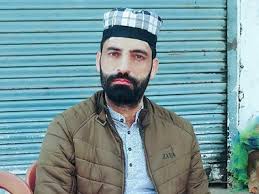As threats against mainstream political workers and leaders increases in South Kashmir, Reyaz Ahmad, a low-key member of the Bharatiya Janata Party (BJP), has been exploring the possibility of migrating to the relatively safer Srinagar, the summer capital of Jammu and Kashmir. At the same time, Ahmad has been pushing the inevitable, trying to assure his family members that the “situation is getting better”, and that his two children, who are enrolled in a government-run school in South Kashmir, cannot be admitted to another school in the city mid-session.
However, the recent killing of one of the most prominent faces of the BJP in Pulwama district, Shabir Ahmad Bhat, allegedly by militants, despite having security, has spread terror through the ranks and files of the party.
“He (Bhat) was provided security by the government, yet he was killed. We don’t have security, which makes it scarier,” said Ahmad, a resident of Pulwama’s Pinglan village. “Before this, party general secretary Gulzar Ahmad Nangroo was fired upon by militants, but his personal security officer fired back and saved him in Pulwama town.”
On Sunday afternoon, he borrowed a car from a neighbour and quietly set out for Srinagar with his wife and two children without informing anyone in his locality. “When the sun would set, I could hear myself breathing because there was so much silence in our home every evening,” he said.
There was a time in Kashmir when being a BJP worker was taboo and nearly impossible for any Kashmiri. The first BJP leader to fall prey to the bullets was Tika Lal Taploo, a Kashmiri Pandit who was killed by militants in 1989, just when insurgency began to plague the Valley.
The party gradually built a tiny base in the villages of Kashmir, albeit behind closed doors. But South Kashmir was one region that had a formidable presence of BJP workers. It was here that the BJP first held its roadshows. Party workers had launched a door-to-door campaign in Anantnag town before the 2014 Assembly elections in Jammu and Kashmir. It was a given that the BJP would not win any seats, but its mere presence was an indicator of the changing politics of the Valley. Those were the days when new-age militancy had yet to take centrestage in Jammu and Kashmir, with no spillover from Hizbul Mujahideen commander Burhan Wani’s killing.
Mohammad Rafiq Wani, who fought the last Assembly elections on a BJP ticket and is the party chief in South Kashmir’s Anantnag district, said there is fear among the workers of all political parties in the state, more so among BJP workers. While many have already resigned, we held a meeting for them on Monday, which around 300 of them attended.
“It is a close-knit society, and everyone knows everyone. Even if someone resigns from the BJP, few would believe it, assuming they will be back after things cool down,” he said.
A day after Bhat’s killing on 22 August, at least two dozen BJP workers met in a small house in Pulwama and decided to migrate from their villages. A majority of them were either Bhat’s associates or had participated in small meetings organised by the BJP in Pulwama district.
“Living in our houses is like inviting militants to kill us,” Arshad, another BJP worker, said at the meeting. “It is better to move to safer areas than wait for death.”
Party leader Altaf Ahmad Thakur said the BJP has “around 30,000 members in just one district of Pulwama” and “around 12,000 of them live in the periphery” of the town. They are the card-holders of the party, but providing security to all is out of question, he said, adding that the BJP had “around 4.3 lakh members in 2016” in Kashmir, a majority of them in the southern region. “Eleven thousand of them are active members of the party who participate in the BJP’s day-to-day activities,” Thakur said.
Bhat is often given the credit for the BJP’s strengthened foothold in Pulwama district, but surprisingly, one of his security guards was withdrawn only a few days before he was killed, making him more vulnerable.
BJP national vice-president and Jammu and Kashmir in-charge Avinash Rai Khanna, who visited Bhat’s house in Pulwama after his death, said there is mounting concern over the security of party workers in the Valley. “Our workers are targeted to lower their morale, but these dastardly acts won’t deter us from carrying out the work for which we are here,” he said.
However, Khanna’s words of assurance will hardly help BJP workers and leaders on the ground. Recently, several party workers in the far-flung villages of Pulwama visited mosques to seek forgiveness. But as militant ranks swelled in these regions, the mainstream activists who participated in political activities began to feel insecure.
In the last few months, as the situation improved after Jammu and Kashmir was brought under Governor’s Rule, several of BJP’s mainstream activists and leaders returned to their homes. Now, Bhat’s murder has forced them to leave home once again.
Bhat’s was the third killing of a BJP political worker since November. The first to be targeted in the last two years was BJP youth leader Gowhar Ahmad Bhat, who was killed by suspected militants in Shopian district. Militants then ambushed Ghulam Nabi Patel, who was earlier associated with the Congress and Peoples Democratic Party, at Rajpora market in April. In South Kashmir, the assassination of Ghulam Hyder Noorani in 1999 is one of the better-known incidents of a BJP leader being attacked. Militants killed Noorani and his three workers during a campaign trail after he was nominated as the party’s candidate for the Anantnag parliamentary seat.
“People made fun of us at one time. They would boo us and crack jokes at our expense,” said Sofi Yousuf, a BJP MLC who joined the party around the same time Noorani was killed. “This too shall pass. We will live here, and we will die her. We aren’t going anywhere.”




